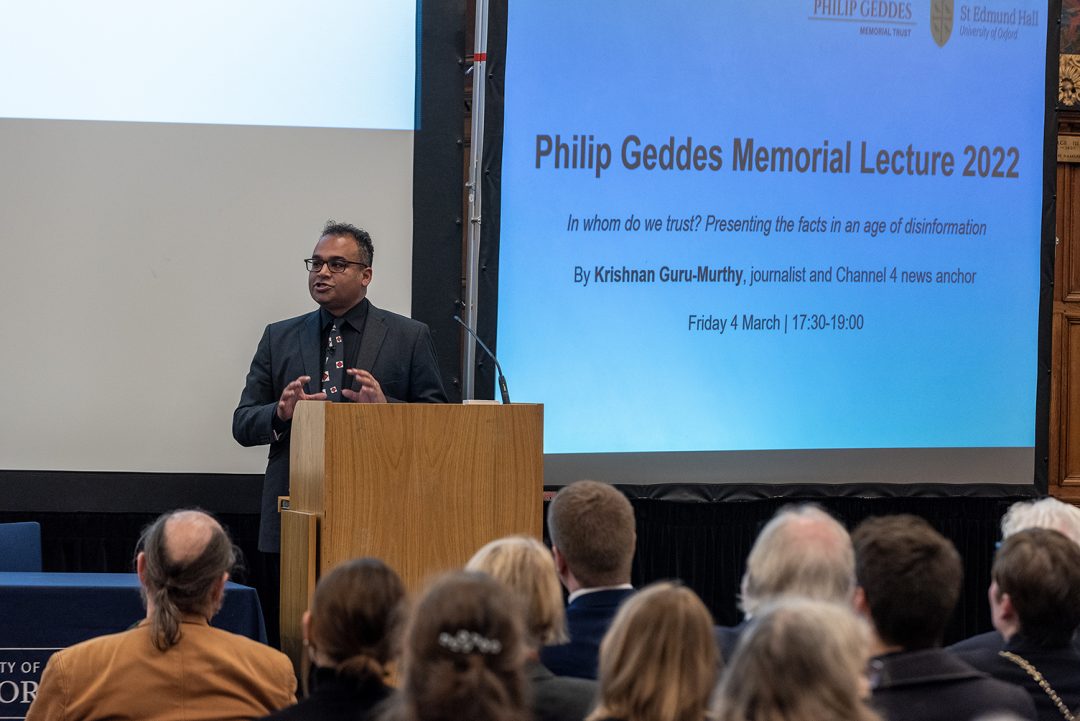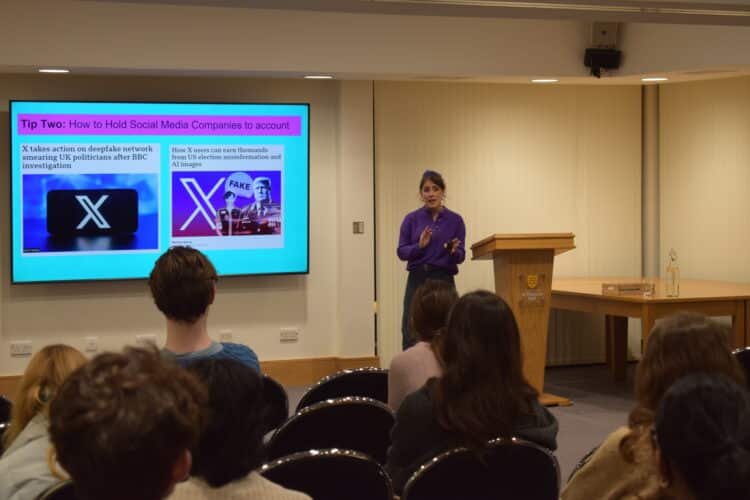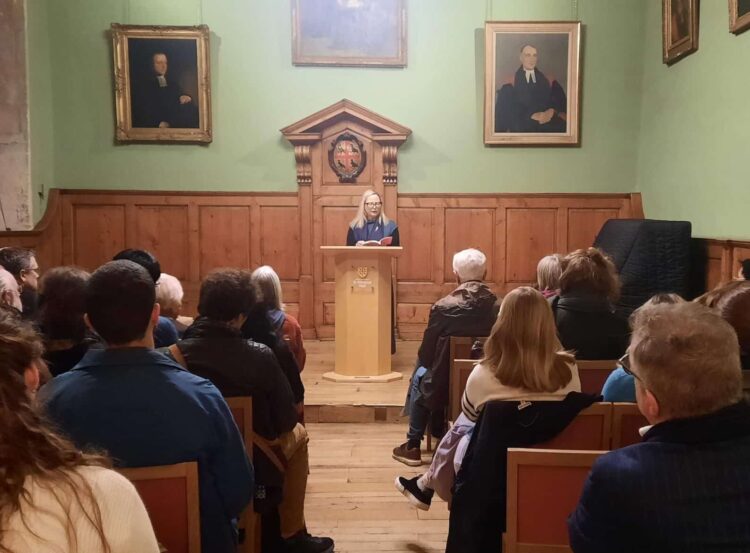Geddes Trust Student Journalism Prizes
Each year, the Philip Geddes Memorial Fund recognises outstanding student journalism at Oxford University through four prestigious awards, each honouring a distinguished journalist. Previous prizewinners have gone on to work at the BBC, ITN, Sky, Reuters, The Guardian, Financial Times, The Times ,The Economist, and the Spectator.
Prizes
The judging panel, comprising some of Britain’s leading editors, correspondents, and broadcasters, looks for accuracy, insight, originality, and a commitment to journalistic integrity. Full details on eligibility and how to apply below:
The Philip Geddes Memorial Prize – £3,000
Awarded to the most promising student journalist, this top prize recognises fact-based, accurate, and engaging reporting that demonstrates initiative and a keen news sense. Judges seek clear, balanced writing that reflects a genuine curiosity about the world and a commitment to truth.
Philip Geddes, a former student of St Edmund Hall was a journalist of considerable promise. In December 1983 he was killed by the blast from a bomb planted by the IRA at Harrods, the West London department store. Philip Geddes was aged 24. A tree and plaque in the gardens of St Edmund Hall commemorate his life.
The Clive Taylor Prize for Sports Journalism – £2,500
Awarded for exceptional sports writing, this prize rewards clear, accurate, and fact-driven reporting combined with flair and insight. Judges will look for work that captures the drama and impact of sport on society while maintaining journalistic rigour and balance.
Clive Taylor, cricket correspondent of The Sun, was widely regarded as a “master craftsman” and one of the most “rational and constructive critics” of the game.
The Ronnie Payne Prize for Foreign Reporting – £2,500
This prize supports an original journalistic project abroad, funded or part-funded by the award. Judges are looking for bold, well-researched proposals with a clear sense of story, purpose, and feasibility. Entries should reflect strong reporting skills and a commitment to international understanding.
Ronnie Payne, a former Royal Marine and History graduate of Jesus College, became one of Britain’s most respected foreign correspondents, covering global affairs for the Daily Telegraph as both a reporter and diplomatic correspondent.
The Paddy Coulter Prize for Opinion Journalism – £2,500
The prize is open to all current Oxford postgraduates or undergraduates regardless of year who specialise in writing opinion pieces on contemporary global issues. The winner will need to demonstrate the ability to present a compelling, thought provoking argument drawing upon evidence and reasoned judgment to support their opinions. The ability to communicate complex ideas in a clear and engaging manner is key.
The prize is in memory of Paddy Coulter, journalist, broadcaster, and campaigner, who fought hard both to change the way western media regularly misrepresent life in the developing world, and to advance the interests of journalism and journalists worldwide.
How to Apply
The closing date for applications is midday on Friday 13th February 2026.
The prize-giving will take place before the Geddes Memorial Lecture on Friday 6th March 2026.
Please read the guidelines closely, as entries not submitted in the correct format will not be considered.
Candidates for the prizes are asked to submit the following in two documents:
- A minimum of three and a maximum of six pieces of journalistic work completed whilst at University, in electronic (Word) format with the web link to the article immediately above the headline and the text pasted into the document.
- Articles must be in English, published in a recognised publication or website and published under a single byline only (no joint bylined articles will be considered).
- Applicants must also submit an outline (maximum 500 words) of a specific journalistic project upon which they propose to spend the award, again in electronic (Word) format. They should also include a rudimentary budget and basic details of any journalistic internships they have undertaken or positions on student publications held.
- The applicant’s name, college, year and subject should be at the top of each page.
- The two documents should have the following file name format: ‘Your surname-Payne Prize-26’, ‘Your surname-Taylor Prize-26’ etc.
- It is absolutely fine to apply for one, two or even all three prizes with the same samples and the same project proposal. However, should applicants wish to submit more samples of work, this is permitted. If, for example, you were applying for both the Geddes and Payne prizes, applicants could submit a minimum of three articles and a maximum of 12 (six articles for each prize). Less is more, but it’s up to the applicant.
Applications should be emailed to geddes@seh.ox.ac.uk by midday on Friday 13th February 2026. Absolutely no late applications will be considered. The subject line of your mail should be clearly marked with the name of the prize(s) for which you are applying.
Privacy Notice and Consent
By submitting an entry to any of the competitions, you agree to give St Edmund Hall and the Geddes Trust permission to collect and process the data you have submitted to administer the competitions and gather statistics to help inform future competitions, for example.
For further information on how we will use your information, please view the Hall’s privacy policy: https://www.seh.ox.ac.uk/wp-content/uploads/Privacy-Policy-GDPR-2023.pdf
The Geddes Lecture
St Edmund Hall and the Geddes Trust organise an annual journalism lecture, which offers student journalists the chance to meet prominent figures in the media world, and to hear their views on the state of journalism today. The lectures are free and also open to the public. Recent speakers have included Gabriel Gatehouse (podcast host of ‘The Coming Storm’ and former International Editor of Newsnight), Dame Melanie Dawes (CEO Ofcom), Krishnan Guru-Murthy (Channel 4 and podcast host of the ‘Ways to Change the World’), Michael Crick (political author and broadcaster), Mark Thompson (former President and Chief Executive Officer of The New York Times Company), David Aaronovitch (The Times) Laura Kuenssberg (BBC), Ian Hislop (Private Eye), Anushka Asthana (The Guardian), Lyse Doucet (BBC) and Evan Davies (BBC).

Related News


